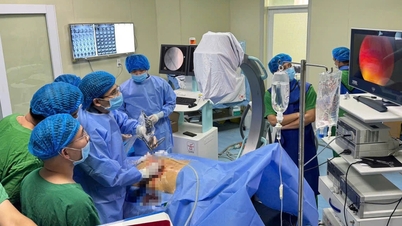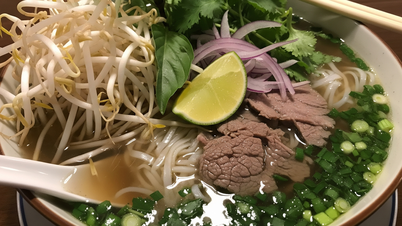Rich in nutrients
Parsley is rich in important nutrients, such as vitamins A, K, and C. Vitamin A is an essential nutrient that plays a key role in boosting immunity and eye health.
Additionally, it is important for the skin and can improve skin conditions, such as acne.
Vitamin K supports bone and heart health. In fact, 8 grams of parsley provides more vitamin K than you need in a day. In addition to its role in bone and heart health, vitamin K is also needed for blood clotting, which can help prevent excessive bleeding.

Many studies have shown the countless health benefits of parsley (Photo: Istock).
Meanwhile, vitamin C helps improve heart health and is important for the immune system. Vitamin C also acts as a powerful antioxidant, protecting cells from damage caused by unstable molecules called free radicals.
Parsley is also a good source of other nutrients such as magnesium, potassium, folate, iron and calcium.
May improve blood sugar levels
According to Nguyen Tri Phuong Hospital (HCMC), in addition to diabetes, high blood sugar can occur due to an unhealthy diet or lack of exercise. High blood sugar can increase the risk of complications such as insulin resistance, diabetes, heart disease and metabolic syndrome.
Animal studies show that the antioxidants in parsley can effectively lower blood sugar levels.
For example, a study in mice with type 1 diabetes found that those given parsley extract had greater reductions in blood sugar and improved pancreatic function than the control group. Combined with a balanced diet, adding parsley to your meals may help support healthy blood sugar levels.
Human studies are needed to better understand the effects of parsley on blood sugar.
May benefit heart health
Parsley contains many plant compounds, including carotenoid antioxidants that benefit heart health by reducing heart disease risk factors.
Diets rich in carotenoids have been shown to improve heart disease risk factors such as chronic inflammation, high blood pressure, and LDL (bad) cholesterol levels. Studies have shown that diets rich in carotenoids may reduce the risk of heart diseases such as coronary heart disease.
Parsley also contains vitamin C, a powerful antioxidant that may benefit heart health. A study of 13,421 people found that those with the highest vitamin C intake had a significantly lower risk of heart disease than those with the lowest intake.
May support kidney function
The kidneys are vital organs that continuously filter the blood, removing waste and excess water, which is then excreted in the urine. Sometimes, when urine becomes concentrated, mineral deposits can form and lead to kidney stones.
Parsley has been shown to have anti-inflammatory properties due to its antioxidants, including flavonoids, carotenoids and vitamin C.
Additionally, parsley may help keep the kidneys healthy by reducing blood pressure, a major risk factor for kidney disease.
Parsley is rich in nitrates, which help dilate blood vessels, improving blood flow and lowering blood pressure. Research shows that nitrate-rich foods like parsley can help maintain healthy blood pressure levels.
The anti-inflammatory properties of parsley, along with its ability to regulate urinary pH and lower blood pressure, may help keep your kidneys healthy and reduce your risk of kidney stones. However, it is important to note that parsley is relatively high in oxalates, so consuming too much may increase your risk of kidney stones.
Other potential benefits
Parsley may also improve health in the following ways:
- Antibacterial properties.
Parsley contains essential oils, including apiol and myristicin, which have antibacterial effects and fight potentially harmful bacteria, such as staphylococcus aureus.
- May benefit bone health.
Parsley is rich in vitamin K, potassium, magnesium and calcium, all of which are essential for bone health.
- Can enhance immunity.
Research shows that apigenin, an antioxidant in parsley, regulates immune function by reducing inflammation and preventing cell damage.
- May improve liver health.
Studies in diabetic mice show that parsley extract can prevent liver damage, enhance liver function, and increase antioxidant levels.
Source: https://dantri.com.vn/suc-khoe/an-rau-mui-tay-vua-giup-cai-thien-duong-mau-vua-tot-cho-gan-than-20250828105900112.htm



![[Photo] General Secretary To Lam attends the opening ceremony of the National Achievements Exhibition](https://vphoto.vietnam.vn/thumb/1200x675/vietnam/resource/IMAGE/2025/8/28/d371751d37634474bb3d91c6f701be7f)
![[Photo] Red flag with yellow star flutters in France on National Day September 2](https://vphoto.vietnam.vn/thumb/1200x675/vietnam/resource/IMAGE/2025/8/28/f6fc12215220488bb859230b86b9cc12)
![[Photo] Politburo works with the Standing Committee of Cao Bang Provincial Party Committee and Hue City Party Committee](https://vphoto.vietnam.vn/thumb/1200x675/vietnam/resource/IMAGE/2025/8/28/fee8a847b1ff45188749eb0299c512b2)


![[Photo] National Assembly Chairman Tran Thanh Man holds talks with New Zealand Parliament Chairman](https://vphoto.vietnam.vn/thumb/1200x675/vietnam/resource/IMAGE/2025/8/28/c90fcbe09a1d4a028b7623ae366b741d)






























































































Comment (0)